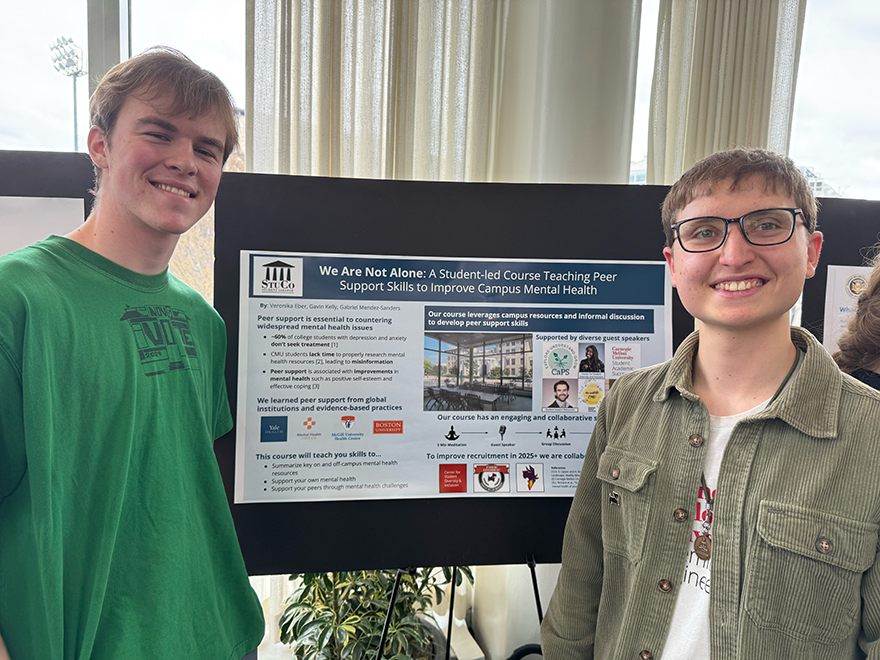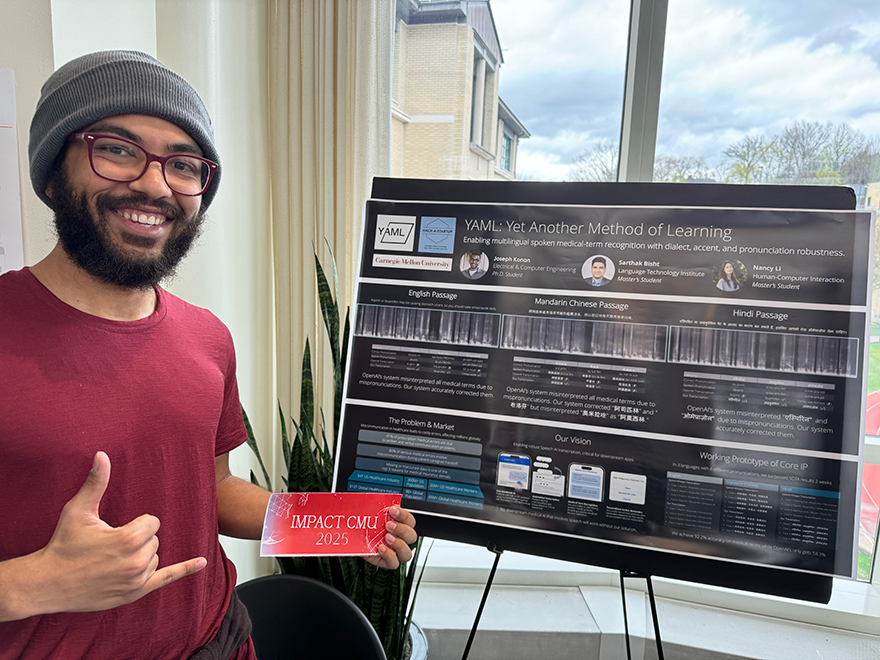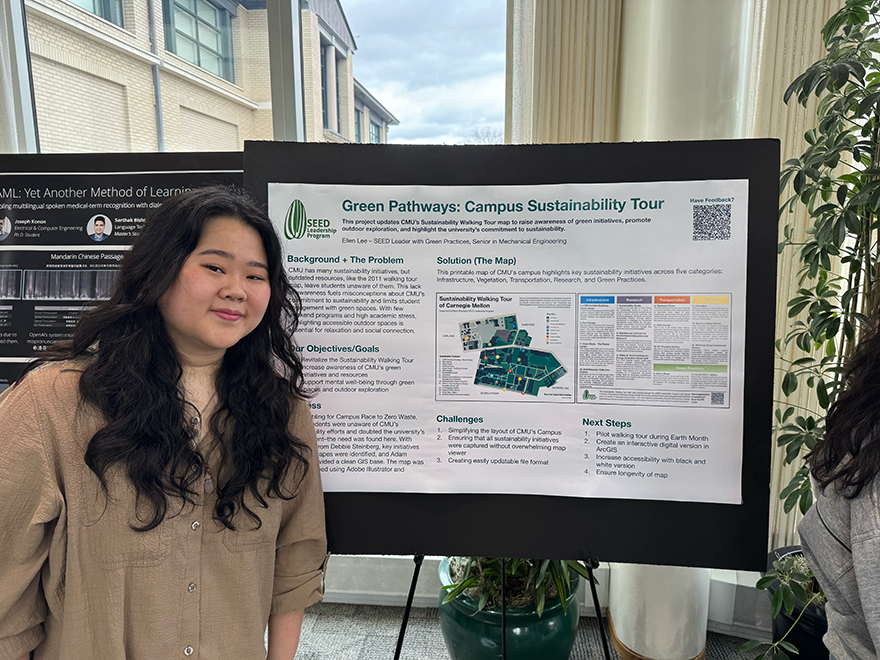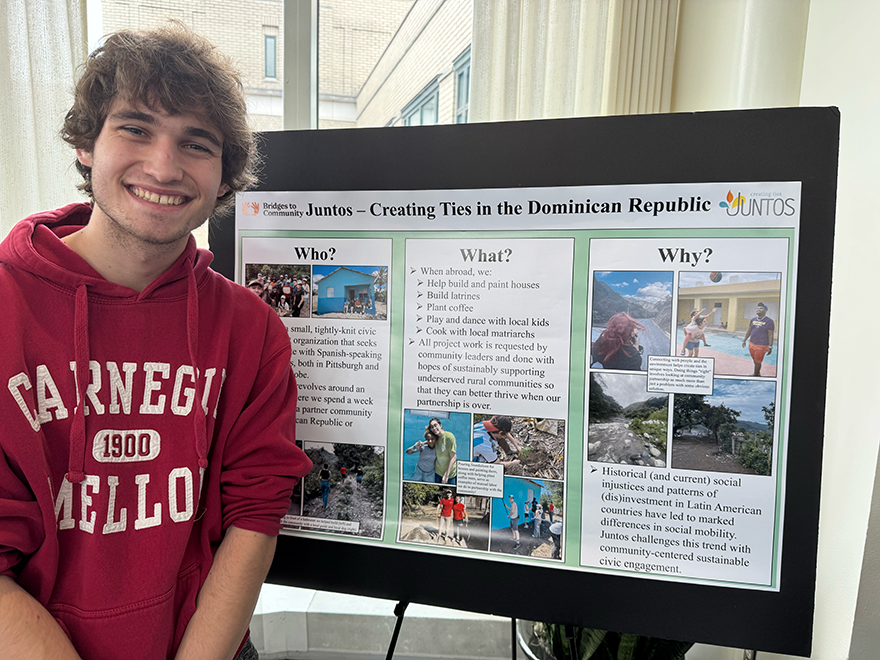Impact CMU features engineering projects with social impact
Impact CMU featured student-led projects with social impact from across the university, including many from the College of Engineering. Projects included AI solutions and volunteering opportunities.
Students and faculty gathered in The Danforth Lounge for the ninth iteration of Impact CMU, an annual showcase at the end of the school year hosted by Design for America (DFA) where students across the university present projects with social impact. The projects were voted on by attendees and faculty judges for three awards: faculty favorite, Design for America, and most impactful. Each winner received $250.
“Impact CMU is a social good showcase where we display different projects from the CMU community focused on tackling various social issues,” said Anna Mathews, co-president of DFA at CMU and a junior studying information systems and human-computer interaction. “It’s a great way for different clubs, organizations, and individuals who are doing projects to showcase their work and celebrate everything they’ve accomplished this year.
Faculty favorite: We Are Not Alone: Peer Mental Health Support Course
Veronika Eber, Gavin Kelly, and Gabriel Mendez-Sanders
This Student College, or StuCo, class invites students into Carnegie Mellon’s Wellness Lab space, where they learn how to better support themselves and their peers through mental health struggles. Students learn skills and tools for supporting themselves and others and accrue a breadth of knowledge on the resources and options for self-care and treatment both on and off-campus through guest lectures, readings, and class discussions.
“All of us peer mental health instructors are so honored that our StuCo resonated with the faculty judges,” said Gabriel Mendez-Sanders, a Fifth Year Scholar studying chemical engineering. “In developing the course, we focused on including evidence-based practices for mental health support from a variety of disciplines. The field of engineering education research informed our course design, with inspiration from engineering mental health researchers like visiting faculty Karin Jensen and Sarah Wilson, the latter of whom I met during a CMU chemical engineering guest seminar.”
Design for America: Habitat for Humanity at CMU
Luke Grupp, Dylan Bonanno, Kara Mathias, Kate Hanson, Arden Ryan, and Eli Slothower
Habitat for Humanity is a nonprofit dedicated to building and improving affordable housing for those in need worldwide. Carnegie Mellon offers alternative spring break trips where students travel within the U.S. for a week to help construct homes, connect with new communities, and enjoy the destination. Past activities have included building homes, painting interiors, deconstructing old houses, relaxing at the beach, attending a rodeo, and enjoying a lot of local food.
“We are honored to receive the Design for America Award from Impact CMU,” said Luke Grupp, a master’s student studying civil engineering. “It feels great to be recognized for the work we do with Habitat for Humanity to help people both here in Pittsburgh and around the country.”
Most impactful: OpenGym
CMU Business Technology Group, Product Studio
OpenGym is a website that provides real-time occupancy tracking of CMU fitness facilities. It allows students to check gym occupancy levels to avoid crowds. OpenGym aims to solve the issue of gym congestion, enhance the workout experience, and promote healthier, more efficient fitness routines for the CMU community.
The judges included Julia Poepping, the director of partnership development for information systems, Andrew Twigg, an associate teaching professor of design, Carl Skipper, the assistant director for research infrastructure services, and Susan Hagan, an associate teaching professor of information systems.
“When we encourage students to use their education to help others, it opens a path to think outside of self-interest and toward people they wouldn’t necessarily encounter,” said Hagan. “When there’s no grade attached, I think it speaks to how people can become invested for a lifetime.”
Students from the College of Engineering had other projects at Impact CMU as well.
Multilingual Speech Recognition of Mispronounced Medical Terms
Joseph Konan, Sarthak Bisht, and Nancy Li
Both experts and non-experts often deviate from standard pronunciation of medical terms due to dialect, accent, and mispronunciation, leading to transcription errors that can impede effective communication. This project harnesses advanced speech recognition and machine learning techniques to accurately transcribe these terms and provide targeted corrective feedback, helping to bridge the gap in understanding and improve overall communication accuracy in medical contexts.
Safeways
Fu-Cheng Pan, Phyllis Chen, Yu-Jui Sung, and Jason Li
SafeWays is a scam prevention system that uses AI tools to provide pre- and post-scam protection through multi-layer large language models and passive integration. It analyzes message patterns in real-time and provides instant alerts and detailed information. SafeWays has a user-friendly interface and robust backend and integrates into multiple platforms including iMessage.
Green Pathways: Campus Sustainability Tour Revitalization
Ellen Lee
Green Pathways: Campus Sustainability Tour Revitalization aims to update and modernize CMU’s Environmental Walking Tour to better showcase the university’s sustainability efforts and resources. Through an updated physical map, it seeks to combat misconceptions about the university’s environmental initiatives while promoting student well-being and engagement.
Partnering With Rural La Guama in the Dominican Republic
Juntos organization
Juntos is a civic engagement student organization that travels to the Dominican Republic at the start of the summer break for a week-long project. Last year, they helped pour four foundations, built a sanitary bathroom, planted coffee trees with a local farmer, danced bachata with the kids from the community, and more. This year will be their last visit to La Guama.






